NEW YORK, N.Y. (A.W.)—On April 17, a panel discussion on Turkish-Armenian relations was held at New York City Hall. Hosted by the Armenian National Committee (ANC) of New York, the panel discussion featured Armenian Weekly editor Khatchig Mouradian, California Courier publisher Harut Sassounian, scholars Bilgin Ayata and Dr. Taner Akcam, and ANCA executive director Aram Hamparian. Over 250 member of the New York and New Jersey Armenian community attended the event, which was co-sponsored by Councilwoman Melinda Katz (D-29th District), who has been a staunch advocate for the Armenians in her district.
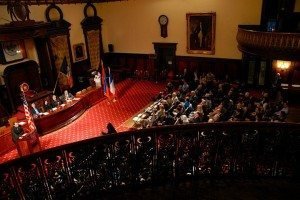
Opera singer Haig Mardirossian opened the event, with the “Star Spangled Banner” and “Mer Hairenik.” ANC-NY chairperson Raffi Mahserjian then invited Archbishop Oshagan Choloyan, the Prelate of the Armenian Apostolic Church of America (Eastern Prelacy) to offer prayers.
In his remarks, Mouradian talked about the recent attempts at dialogue between Turkey and Armenia. “The exchange of ping-pong players in the early 1970’s between China and the U.S. that paved the way for President Richard Nixon’s visit to Beijing in 1972 became known as ‘Ping Pong Diplomacy.’ When the Armenian president in 2008 extended an invitation to his counterpart to visit Yerevan and attend the soccer match, the media started referring to the Turkey-Armenia dialogue as ‘Soccer Diplomacy,’” he explained.
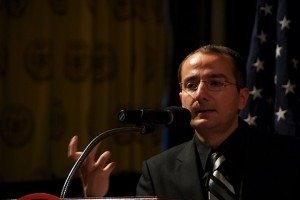
“While such a term could be fitting to the rapprochement between two powerful countries like the U.S. and China, a similar description for Turkey and Armenia is misleading because it assumes that Turkey and Armenia are ‘competing’ on a level playing field. In the latter case, not only is there a glaring power asymmetry, but that power asymmetry is largely a result of a genocide perpetrated by one of the sides against the other.” Mouradian also said that the “Turkish-Armenian dialogue” is a misnomer, because what is going on between the two states is simply Turkey-Armenia dialogue and, as such, does not encompass all the elements that are crucial for a just and lasting solution.
Mouradian then introduced Sassounian, who said, “Turkey has so far brilliantly executed all of its sinister objectives.” After providing a background to the negotiations between Turkey and Armenia, he added, “As it became clear in late 2008 that Barack Obama would win the presidency and possibly keep his promise to recognize the Armenian Genocide, the Turkish government launched a major campaign to convince the international community that Armenia and Turkey were engaged in delicate negotiations which would be undermined if third countries acknowledged the genocide.”
Clearly, Sassounian noted, the Turks were not sincere in their declared intentions. “Had they been serious, they could have opened the border in a matter of days, not months or years!”
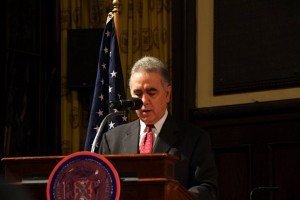
To counter the Turkish and Azeri ploys, Sassounian said that Armenia’s leaders should: start playing hardball with Turkey and Azerbaijan; stick to Armenia’s long-avowed position of no preconditions for opening the border and establishing diplomatic relations with Turkey; resist pressures from Russia, the U.S., and Europe; and consider setting Oct. 7 as a deadline for opening the border. He also said that the Armenian Parliament should safeguard Armenia ’s national security—long in advance of any border accord—by prohibiting all foreigners from purchasing land in sensitive border areas and making investments in strategic resources and industries.
Ayata spoke next. “It is very instructive to look closely at the developments in the Kurdish conflict when one is concerned with the Armenian Genocide, and vice versa,” she said. “This delivers important insights on how at present the Turkish state manages to slowly move away from the politics of denial without arriving at a politics of acknowledgment.”
Talking about the recent apology campaign launched by some Turkish intellectuals, Ayata said, “While on the one hand, the intent for apology is very honorable and certainly a step into the right direction, the ambivalent wording of the statement, its limited scope as well as the use of the term ‘Great Catastrophe’ instead of ‘genocide’ casts doubts on the very intent of apology. The choice of the term ‘Great Catastrophe’ reveals a great ignorance towards those to whom the apology is extended to. To me, the campaign looks like an act of appeasement instead of an apology that has taken the sensitivities of the Turkish state more into account than the sensitivities of genocide survivors.”
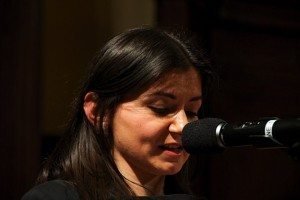
She gave the example of a Kurdish intellectual who stands in stark contrast to the apology campaign. “Berzan Boti is a Kurdish political activist and author from Siirt who contributes regularly to Kurdish debates that take place on the web. He spent 11 years in the infamous Diyarbekir prison. A few years ago, he found out that the land owned by his family had actually belonged to Assyrians that used to live in his village. During the 1915 genocide, the Assyrian families were killed and deported, and his forefathers confiscated the land of an Assyrian family that was killed. In 2007, Berzan Boti approached the Seyfo Center in Sweden that struggles for the recognition of the genocide and told them that he wanted to return the land to its rightful owners. Since they were no longer alive, he gave it to the Seyfo Center.”
Dr. Taner Akcam spoke about issues of national security and the recognition of the Armenian Genocide. He said, “Pitting national interests against morality as mutually exclusive is wrong. Any security policy in the Middle East that excludes morality cannot ultimately work. Eventually it comes to undermine national security. Indeed, if one knows Turkey and the Middle East, one would easily recognize that history and historical injustices are not just dead issues from the past; the past is the present in the Middle East. There is a strong interconnection between security, democracy, and facing history in the Middle East.”
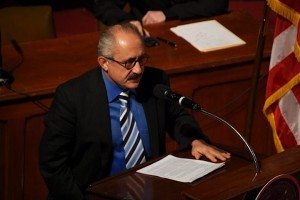
Akcam noted that if the United States declares what it believes to be the truth and stands behind it, “not only will it gain some self-respect on the subject, but it will liberate both Turks and Armenians and itself in the process.”
He concluded, “I believe that we will enter a new era where morality and realpolitik will not be considered mutually exclusive—if President Barack Obama should put an end to this lingering problem and liberate everybody in the process by an official acknowledgment of genocide.”
Aram Hamparian said it was a privilege to be part of the panel discussion with “Taner Akcam, a truly historic figure, with Bilgin Ayata, who represents a bridge of understanding between Kurds and Armenians, and, of course, Harut Sassounian, who, for decades has been a moral compass and a teacher to a generation of Armenian American activists.”
“America’s stand against genocide should not be treated as a political commodity to be bartered or retreated from under pressure,” he said, “but rather as a core American moral value, one to be advanced regardless of the political cost. This is the type of nation we should be, one that understands that our willingness to confront genocide cannot be traded for basing rights, overflights, and energy pipelines.”
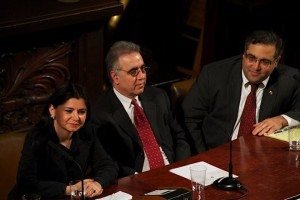
“No, we are better than that,” he added. “Stronger, more principled, and committed—as a matter of true national security—to standing tall among the nations of our world, earning the respect of all countries through the defense of our values.”
He concluded by saying, “Our movement is not simply an Armenian one, but rather an American one destined to change America, to lift—through great sacrifice and literally decades of effort—the United States’ response to genocide to the level of our values. This represents a great service by our community to America and the world, one that will help reassert American moral leadership and help prevent future genocide.”
The event concluded with a lengthy and lively question-and-answer session.


I wish I had been there. It must have been an outstanding event.